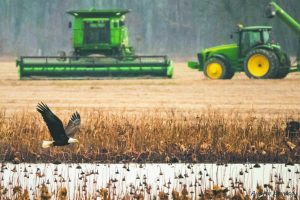R.F.D. NEWS & VIEWS: COVID-19 lawsuits coming to processing plants
By Tim Alexander for Chronicle Media — April 23, 2020

A bald eagle glides over a field in New Columbia in Southern Illinois. The eagle is one of a pair that nest nearby. The locals have named them Edgar and Edna. (Photo by Austin Kennedy)
This week’s roundup of Illinois farm and rural news is led by disruptions in the meat supply caused by COVID-19. What can be expected? We also have info on state-approved pesticide application courses now moved online due to the virus. Please read on for some of the latest info on these and other matters of importance to all Illinoisans:
AAMP: COVID-19 lawsuits coming to processing plants
ELIZABETHTOWN, PA. — The hits just keep coming to the nation’s meat processing plants. As of press time, production at pork and beef processing plants in Colorado, South Dakota, Pennsylvania and Iowa have been closed due to a workforce shortage. With many plant workers ill from COVID-19, and at least one death reported, the situation has turned dire. Resultantly, an impending U.S. meat shortage is being forecast by many market analysts.
Adding to the woes, the meat industry has been hit with a barrage of accusations that it is not doing enough to prevent employees from potentially being exposed to the virus. This is according to the American Association of Meatpackers, whose attorney, Richard Alaniz, issued an advisory letter to its members on April 14.
“The lawsuits are just beginning, and no industry is immune” noted Alaniz, an employment attorney from Houston, Texas. “Walmart has recently been sued after an employee dies after contracting COVID-19 (they claim that he got it at work). Since then Walmart has changed its procedures to take employee temperatures, provide gloves and masks for employees, and more closely follow requirements from the CDC. There will be more lawsuits like this one and the meat industry is particularly vulnerable to them due to the close quarters in which employees are required to work.”
Alaniz recommended a number of steps that meat processing plants could undertake in order to minimize the risk of employee exposure to COVID-19. Among the suggestions: encourage practicing social distancing to the best extent possible, make efforts to obtain masks and other PPE, and provide additional hand sanitizing stations throughout the facility.
Report: Corn planting underway in Illinois
SPRINGFIELD — Illinois farmers have managed to plant a little corn this spring, sandwiched between rainstorms, snowfall and frost. Corn planted reached 1 percent the week ending April 12, 2020 according to the USDA-National Agricultural Statistics Service Illinois Crop Progress report. This compares to the five-year average of 2 percent. There were 4.7 days suitable for fieldwork during the week. Statewide, the average temperature was 53.3 degrees, 4.7 degrees above normal. Precipitation averaged 0.38 inches, 0.45 inches below normal. Topsoil moisture supply was rated at 6 percent short, 79 percent adequate, and 15 percent surplus. Subsoil moisture supply was rated at 7 percent short, 78 percent adequate, and 15 percent surplus.
Most farmers are still prepping their fields for planting, especially in the northern areas of the state. Motorists should expect to see large farm machinery moving to and from crop fields, especially in rural areas, and farmers should continue to exercise caution when using the roads, according to the Illinois Department of Labor.
NASS seeks winter wheat info
SPRINGFIELD — NASS’ April 13 crop progress report noted that Illinois winter wheat considered headed was 1 percent, the same as last year and the five-year average. Winter wheat condition was rated 4 percent very poor, 6 percent poor, 29 percent fair, 42 percent good, and 19 percent excellent, according to the report.
NASS estimated the amount of winter wheat planted in Illinois at 570,000 in a report published in March. Beginning May 12, Illinois NASS will be publishing a series of monthly crop reports that project the average wheat yield per acre across the state. Questionnaires will be mailed to selected producers inquiring about their wheat yield beginning in late April for May report. The series will continue into August, according to Illinois State Statistician Mark Schleusener.
“These monthly reports are used by farmers and the entire wheat industry,” Schleusener said, in a USDA-NASS news release. “They rely solely on participation and response for Illinois producers.” The confidential reports from farmers will be first published in the May 12 Illinois Crop Production report.
ICGA offers farm COVID-19 checklist
BLOOMINGTON — Everyone should have an emergency list of all of their key plans and contacts in case of emergency, and a global pandemic generally qualifies. The Illinois Corn Growers Association recently issued a “Farm Readiness Plan” template for compiling such a list. It can be found on their website, www.ilcorn.org. “Take a few minutes to write out your plan and put it where it can be easily found. Give a copy to a trusted neighbor or friend,” the ICGA urges.
Included is a section on General Farm Information:
- Hired help contact info, primary job responsibilities
- Typical machinery dealership/repair services used
- Crop adviser/Farm manager name & number
- Crop insurance agent name & number
- Ag lender name & number
Another section is devoted to Field Plans:
- Field names and locations
- Intended Crop
- Seed Varieties, Where is Seed located, Who is your seed dealer
- Planting rates
- What still needs to be done? Tillage, Spring Fertilizer, Burndown
- Who is your retailer for chemical and fertilizer?
- Have spring chemical and nitrogen programs been finalized?
Other sections of the planner include stored crop plans and livestock plans. In addition, helpful documents can be downloaded from the ICGA webpage.
Illinois Farm Fact:
The first soybean planted in the U.S. was in Alton, Illinois in 1851. (Illinois Farm Bureau)







